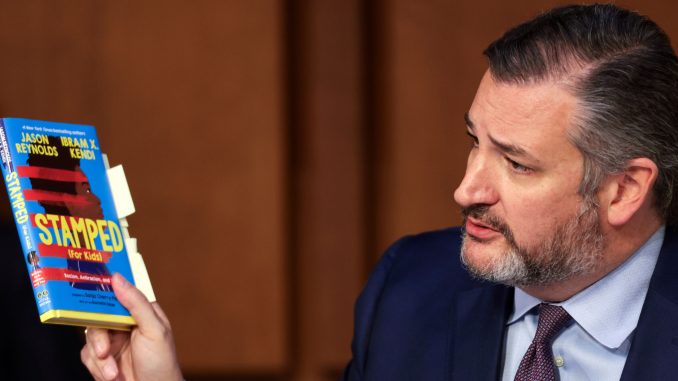
It was a bit cognitively dissonant last month when some of the best-known merchants of critical race theory began whining that their campaign to transform society had hit a rough patch.
Surely, they couldn’t be serious? Woke orthodoxy is firmly in place in all the cultural centers and even at 1600 Pennsylvania Ave.
Then along came a report from one of the cathedrals of the woke canon, the University of California-Los Angeles, which cataloged just how extensive the groundswell of resistance to critical race theory has been over the past two years. It seems that state legislators and local policymakers have responded to grassroots opposition to CRT with a raft of measures and are getting better at passing them.
That put in context Ibram X. Kendi’s complaint to a CNN interviewer in late March that momentum had been halted in his work—which Kendi calls “antiracism,” but which is, in fact, a series of race-based proposals that demand the government and the private sector illegally take account of race when making decisions.
Kendi told CNN that after the Black Lives Matter-led riots in 2020, he had hoped there would be momentum for massive change. And it is true that immediately after, and even in the years since, there has been a panicked rush by many in charge of America’s elite cultural institutions to accept that “systemic racism” actually exists and that, ergo, the system itself needed to be overhauled.
But the would-be revolutionaries pushed too hard, too fast. And Americans pushed back.
“The momentum was just crushed by a pretty well-organized force and movement of people who are seeking to conserve racism,” Kendi told CNN, predictably dismissing his critics as the ones who are racist.
Similar frustrations were aired at a panel led by Robin DiAngelo, another star retailer of CRT nostrums who, like Kendi, gets corporations to pay tens of thousands of dollars for hourlong harangues on systemic, structural, and institutional racism.
Joining DiAngelo for the March panel were Mary-Frances Winters, founder of the Winters Group, which also does “social justice” training, and Mareisha Reese, president and CFO of the Winters Group. But the atmosphere on the panel was far from celebratory, as the three ruminated on what they considered a scary development: Corporations were backing away.
Winters said her group had started to lose contracts. After first hiring her organiation for the trainings, she said, companies now say, “Oh, this is what you mean by anti-racism work? That’s not what we signed up for.”
DiAngelo, for her part, sniffed that corporations “proclaimed investment with absolutely no true investment,” adding, “so many companies have the diversity question … and no one on the hiring committee even knows how to assess a good answer.”
A visit to the Winters Group’s site reveals it to be a typical, full-service provider of diversity, equity, and inclusion (to which they add a “J” for justice) work.
The first service the Winters Group provides is an “equity audit” of your company to assess everything through what it says are justice and equity “lenses.” Then it proposes “the metrics that matter,” which one assumes would place more emphasis on the numerical proportionalism of every group under the sun that counts as marginalized and less on traditional metrics such as profitability and solid business models.
Following that, the organization provides “justice-centered” strategy development and further coaching. Winters advertises itself as made up of “culture change experts who partner with you to co-create your DEIJ vision.”
And that may give us a clue as to why some corporations may be canceling contracts and telling Winters, “I didn’t sign up for this.”
Americans have rejected the “cultural change” sought by critical race theory. Polls, including this recent one in January by McLaughlin and Associates, show that the public rejects CRT and other woke ideologies, such as transgenderism, by large margins.
One comprehensive poll of 1,500 people, including 1,322 registered voters by The Economist/YouGov, conducted April 8-11, revealed that large majorities oppose males playing in women’s sports, and overwhelmingly support requiring schools to inform parents if their children request opposite-sex pronouns. The poll didn’t canvass views on either critical race theory or diversity, equity, and inclusion.
This is why state legislators and local officials, reflecting the view of their constituents, are passing bills or taking other government measures, such as bans on transgender participation in women’s sports and compelled acceptance of critical race theory, that push back on wokeism.
On critical race theory specifically, government actors (federally and across 49 states and their localities) introduced a total of 563 anti-‘CRT’ measures” between January 2021 and December 2022, according to the UCLA Law School’s CRT Forward Tracking Project.
Moreover, “the momentum of the anti-CRT campaign has to this point shown no signs of slowing: nearly the same number of measures were introduced in 2021 (280 total) and 2022 (283 total),” the tracker says.
Indeed, a higher rate of measures opposing critical race theory got enacted in 2022 than in 2021, and nearly 39 are pending across the land.
All of this bodes well for the effort to frustrate the aims of the DiAngelos and Kendis of the world. Nobody has voted on the plan to change the culture. On the contrary.
First published in the Washington Examiner
Have an opinion about this article? To sound off, please email letters@DailySignal.com and we’ll consider publishing your edited remarks in our regular “We Hear You” feature. Remember to include the url or headline of the article plus your name and town and/or state.

